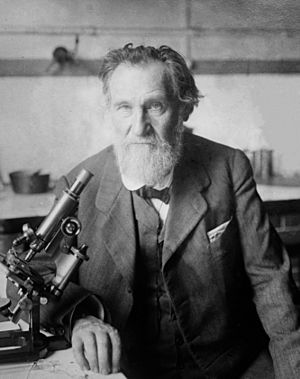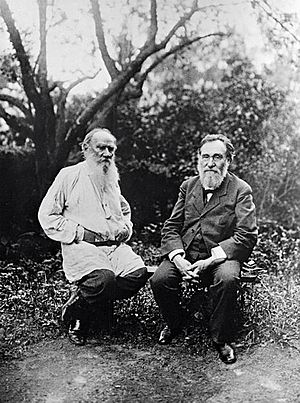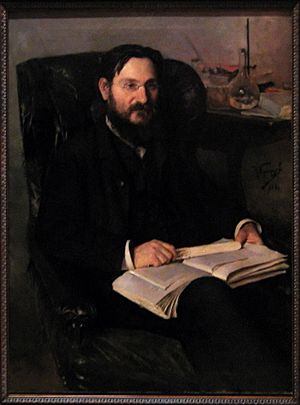Élie Metchnikoff facts for kids
Quick facts for kids
Élie Metchnikoff
|
|
|---|---|

Metchnikoff c. 1910–1915
|
|
| Born |
Ilya Ilyich Mechnikov
15 May [O.S. 3 May] 1845 Ivanovka, Kharkov Governorate, Russian Empire
|
| Died | 15 July 1916 (aged 71) Paris, France
|
| Alma mater |
|
| Known for |
|
| Awards |
|
| Scientific career | |
| Fields | |
| Institutions |
|
Ilya Ilyich Mechnikov (also known as Élie Metchnikoff) was a famous Russian zoologist and a pioneer in the study of the immune system. He and Paul Ehrlich won the 1908 Nobel Prize in Physiology or Medicine for their important discoveries about how our bodies fight off diseases.
Mechnikov was born in what is now Ukraine. His father was from a noble family in Moldavia, and his mother was of Ukrainian-Jewish background. He lived and worked for many years in the Russian Empire before moving to France to continue his research.
He is often called the "father of innate immunity". This is because he was the first to discover a key process called phagocytosis in 1882. This is when special cells, called phagocytes (like macrophages), "eat" or engulf harmful invaders like bacteria. This discovery showed how our body's natural defense system works and became a basic idea in the science of immunology.
Mechnikov also thought a lot about ageing. He believed that certain good bacteria, like those found in yogurt, could help people live longer and healthier lives. This idea led to the modern concept of probiotics in medicine. He even created the word "gerontology" in 1903, which is the study of aging and how long people live. Because of this, he is also known as the "father of gerontology".
Contents
Early Life and Learning

Ilya Mechnikov was born on May 15, 1845, in a village called Ivanovka, in what was then the Russian Empire and is now part of Ukraine. He was the youngest of five children. His mother, Emilia Lvovna, was very important in encouraging his interest in science.
In 1856, Mechnikov started at the Kharkov Lycée, where he became very interested in biology. He decided to study natural sciences at Kharkov Imperial University and finished his four-year degree in just two years!
After university, he traveled to Germany to study marine animals. He made his first scientific discovery there: he found out how some tiny worms (nematodes) reproduce in different ways. He also discovered how cells inside a flatworm could digest food. This finding was very important for his later work on how our bodies fight off germs. In 1867, he earned his doctorate from the University of Saint Petersburg.
Career and Big Discoveries
Mechnikov started his career as a professor at the Imperial Novorossiya University when he was only 22 years old. Later, he moved to the Pasteur Institute in Paris, France, where he spent the rest of his life doing research.
How He Discovered Phagocytosis
Mechnikov became very interested in how our bodies fight off tiny invaders, like microbes. In 1882, while working in Sicily, he made his most famous discovery. He was studying the larvae of starfish. He put small thorns from a citrus tree into the starfish larvae. He then saw unusual cells gathering around the thorns.
He realized that in animals with blood, special white blood cells rush to areas where there's an injury or infection. He thought these cells might be "eating" and destroying harmful bacteria. He talked to a professor named Carl Friedrich Wilhelm Claus, who suggested the name "phagocyte" for these cells that can surround and kill germs. He shared his findings in 1883.
His Theory of Immunity
At first, many scientists, including famous ones like Louis Pasteur, didn't believe Mechnikov's idea that white blood cells could destroy harmful bacteria. They thought these cells might actually spread the germs. But Mechnikov's main supporter, Rudolf Virchow, helped publish his research. Eventually, his discovery of these phagocytes was proven correct, and it led to him winning the Nobel Prize in 1908.
Mechnikov's work showed that certain white blood cells are attracted to bacteria. This attraction helps our body's innate immune response (our natural, first line of defense) fight off pathogens (germs that cause disease).
His Ideas on Aging and Probiotics
Mechnikov also spent a lot of time thinking about why people age. He believed that harmful bacteria in our gut could cause aging. He thought that lactic acid bacteria, like those found in yogurt, could help us live longer. He noticed that people in Bulgaria, who ate a lot of yogurt, seemed to live very long lives.
To test his idea, he drank sour milk every day! He wrote about his scientific thoughts on aging in his books, The Nature of Man: Studies in Optimistic Philosophy (1903) and The Prolongation of Life: Optimistic Studies (1907). His idea that good bacteria could help our health, which he called "orthobiosis," was an early step towards the modern understanding of probiotics.
Awards and Honors
Ilya Mechnikov received many awards for his important work. He shared the Nobel Prize in Physiology or Medicine in 1908 with Paul Ehrlich. He also received an honorary degree from the University of Cambridge and the Copley Medal in 1906. He was made an honorary member of important science academies in Paris and Saint Petersburg. Today, universities in Russia and Ukraine are named after him, honoring his lasting contributions to science.
Personal Life
Mechnikov was married twice. His first wife, Ludmila Feodorovitch, passed away in 1873. In 1875, he married his student, Olga Belokopytova.
Even though he was baptized in the Russian Orthodox Church, Mechnikov became an atheist. He was very inspired by Charles Darwin's theory of evolution, which influenced his scientific work and ideas.
Ilya Mechnikov died in Paris in 1916 from heart failure. According to his wishes, his body was used for medical research, and his ashes are kept at the Pasteur Institute library.
Images for kids
See also
 In Spanish: Iliá Méchnikov para niños
In Spanish: Iliá Méchnikov para niños
 | John T. Biggers |
 | Thomas Blackshear |
 | Mark Bradford |
 | Beverly Buchanan |



